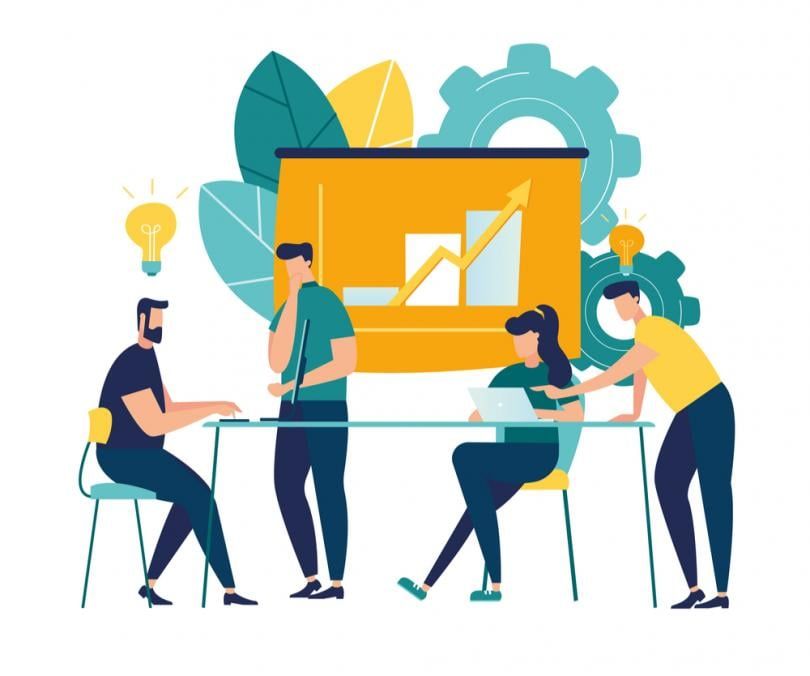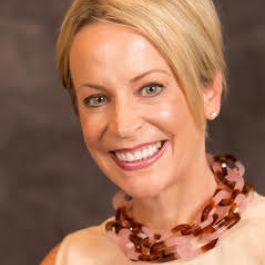
The skills essential for a salesperson’s success encompass much more than an extroverted and persuasive personality. Actually, it’s often the opposite traits that officially seal the deal and turn a prospect into a customer.
“Contrary to the stereotypical extroverted sales rep, some of my most effective and insightful client interactions are when I do the least amount of talking, and the most active listening,” Carey Pasek, a senior sales rep at DFIN, said.
Selena Sacchetti, a senior sales executive at Grubhub, agreed that leading with empathy better equips reps to interact with prospects and understand their needs.
For more insight into the sales skills essential for success, Built In connected with Pasek, Sacchetti, and Mothership’s Senior Sales Manager Matt Williams.
Grubhub is an online, mobile food-ordering and delivery marketplace that features over 245,000 restaurants spanning 4,000 U.S. cities.
Senior Sales Executive Selena Sacchetti described her sales approach as empathetic. She’s found that putting herself in a prospective partner’s shoes has enabled her to interact with them in a way that helps them better understand Grubhub and the service it provides. Sacchetti’s empathetic approach also includes careful listening and responding to prospects, as well as addressing all questions clearly and thoroughly.
What skill do you consider to be the most essential for your success as a salesperson, and why?
Focusing on just one task at a time is a skill that has helped immensely. In sales, there are a hundred different things I could be doing at any given point in the day. This can be overwhelming because we all want to spend our time as efficiently as possible. It’s easy to get worried and feel like I should be working on something other than what I’m working on at the time. If I’m caught up trying to decide which leads list to work off of or if it would be more beneficial to send emails, prospect or make calls, I end up bouncing back and forth between tasks, not really making a dent anywhere. Multitasking has never worked for me.
My most successful days are when I pick one specific task and hone in on that. Whether it's for 30 minutes or three hours, I pick one activity and I don't deviate from it. After I’ve dedicated an allotted amount of time to one task, then I can move on to the next. Working this way is beneficial for a couple of reasons. Channeling my efforts into just one task helps me maintain momentum. It also forces me to isolate practices so I can more accurately evaluate what was impactful and what’s worth dedicating more time to.
What’s another skill that is less obvious or less appreciated that you also consider critical for sales success?
Working with an empathetic approach goes a long way. Putting myself in a prospective restaurant partner’s shoes enables me to interact with them in a way that makes it easier to engage with me and with Grubhub. I try to think: “How would I want to be greeted on the phone?” and, “How would I want this aspect of our platform explained?” I communicate with people the way I would prefer someone to communicate with me.
Keeping in mind that one of Grubhub’s core values is to be “authentically fun” helps me do that. I’m more likely to read emails with concise wording and fun GIFs, so those are the kinds of emails I send. I’m more likely to spend 10 minutes on the phone with someone who’s fun to talk to, so I try to make people smile when I call them. Having enthusiasm goes hand in hand with being fun, so it’s super important to bring that to my work. If I’m not excited to be on the phone, why should the other person be? I also make sure people know that I care and that Grubhub cares. Carefully listening and responding shows I’m invested. I make sure to directly address all questions clearly and thoroughly. At the end of the day, I think of the sales experience I would want and then create that.
My most successful days are when I pick one specific task and hone in on that.”
Throughout your sales career, what specific steps have you taken to strengthen these skills? And what advice do you have for sales pros looking to do the same?
To strengthen my focus and productivity, I’ve always made a to-do list for every day. Most of the time I write my list for the next day the night before, so I can start the day with a game plan. My advice for creating more effective to-do lists is to have the items on the list be specific activities rather than objectives. Writing “add three new restaurants to my pipeline” does not help guide my workflow. It’s vague and does not tell me explicitly what to focus on. How am I adding these three new restaurants to my pipeline? Instead, my to-do lists include bullets like, “spend two hours between 9 a.m. and 11 a.m. calling restaurants in ZIP codes x, y and z.”
To work with a more empathetic approach, I continuously re-evaluate what I’m doing through the lens of a prospective restaurant partner. I recommend listening to recorded phone conversations and re-reading written content regularly. Listening and reading as if on the other side of the conversation offers a different insight and tells me what to change. I can then adjust what I say over the phone and what I write in emails to better replicate the sales experience I would want and that I think people will be more receptive to.
Mothership is a logistics company that’s focused on making freight delivery more efficient with real-time tracking, on-demand truck booking and same-day delivery.
Senior Sales Manager Matt Williams said that in order for sales reps to be successful, they need to be able to independently solve problems that come their way. This includes partnering with different teams throughout the entire organization to come up with a solution as well as effectively communicating that solution to customers and prospects.
What skill do you consider to be the most essential for your success as a salesperson, and why?
Since the pandemic began, I’ve found a consultative approach to be key to my team’s success. With supply chains across the country impacted differently, it’s pivotal that we actively listen to our prospects’ circumstances and needs and leverage that to determine which features in our arsenal will connect most effectively. We are so much more likely to help a business by making sure we are actively engaging and listening to their needs and tailoring our strategy accordingly.
Another key skill is storytelling. I’ve partnered with our marketing and design teams to evolve our product demo to tell the story of how Mothership breaks down traditional legacy models and revolutionizes the industry on a macro level and exactly how that will specifically benefit a prospect’s supply chain on a micro level. The ability to tell that story clearly and specifically while also being tailored to a prospect’s circumstances is an absolutely crucial part of our sales strategy.
Independent problem-solving and the ability to partner with different teams has been critical for my team's success.”
What’s another skill that is less obvious or less appreciated that you also consider critical for sales success?
Independent problem-solving and the ability to partner with different teams in the organization has been critical for my team’s success at Mothership. I have too often seen many sales reps minimize problems that touch other departments because they don’t completely understand the problem or a solution isn’t obvious. The best sales reps truly function as boots on the ground and effectively communicate prospect and customer feedback back to the wider organization to ensure problems are resolved. They are a part of solving the problem. Working at a startup presents infinite opportunities to expand your skill set and sharpen your experience beyond strictly selling to become the best professional version of yourself.
Throughout your sales career, what specific steps have you taken to strengthen these skills? And what advice do you have for sales pros looking to do the same?
Some of the best advice I received early on in my career was, “listen to what you don’t want to hear.” It took me many years to understand what that really means. Critical thinking and the ability to receive tough feedback are probably the most challenging aspects of working in sales.
Some of the best growth in my career has come from requesting continuous feedback and training to hone my strengths and identify my weaknesses. Do not be afraid to ask your managers and your team for honest feedback, especially in areas that you think you may be struggling in. I can tell you to this day, I am still trying to truly listen to what I don’t want to hear when receiving feedback, but it’s undoubtedly what has helped me grow the most.
Donnelley Financial Solutions, or DFIN, delivers end-to-end risk and compliance solutions through its proprietary software domain.
For Senior Sales Representative Carey Pasek, active and honest listening is a less obvious yet essential skill for success as a salesperson. She said that while it’s good to be extroverted, she’s found that some of her most effective and insightful client interactions are when she does the least amount of talking and the most amount of active listening.
What skill do you consider to be the most essential for your success as a salesperson, and why?
Process discipline. From a relationship map to a whitespace document, a structured approach to account management is essential. We need to be asking ourselves questions like, “Who do we know?; Who don’t we know that we need to know?; What do we understand about the account?; What are the gaps in understanding?”
Taking the time and having the discipline to honestly assess the current state of our relationship with a client is foundational: you can’t know where you’re going if you don’t understand where you’re starting. This requires time and effort, however, it’s critical for success. As the saying goes, “Don’t be upset for the results you didn’t get for the work you didn’t do.” You have to be willing to put in the work.
Managing an account involves constant discovery and to be successful in discovery, you have to be an engaged listener.”
What’s another skill that is less obvious or less appreciated that you also consider critical for sales success?
Active and honest listening. Contrary to the stereotypical, extroverted sales rep, some of my most effective and insightful client interactions are when I do the least amount of talking, and the most active listening. Client insight is exponentially easier to excavate when you stop “pitching” and start listening. You can’t solve a problem if you don’t understand what you’re solving for. Ask a lot of questions then sit back and listen. Managing an account involves constant discovery and to be successful in discovery, you have to be an engaged listener.
Throughout your sales career, what specific steps have you taken to strengthen these skills? And what advice do you have for sales pros looking to do the same?
I’ve taken active ownership in my own learning: to “get smart” where I recognize I have knowledge deficiencies and then take the initiative to locate resources to shore up those gaps. Coming into this business many years ago, while I had world-class sales training and years of sales experience, I knew absolutely nothing about the financial services vertical. From that aspect, I was probably the least likely candidate for this sales role! I literally got my hand on any book or article I could find to figure out what this space was about.
With this as a starting point, I asked — and to this day continue to ask — a lot of questions. Just because you are a top performer doesn’t mean you have an innate ability to understand things.
In my experience, it’s the opposite. A top performer is never too proud to recognize that they don’t understand something. Chances are, there are more people who don’t understand it either — they’re just afraid to show vulnerability in asking. Don’t be that person. You’ll be a better rep and a more qualified consultant to your clients by asking. Competence is confidence. Just don’t expect anyone to hand it to you. Continually be curious and take responsibility to constantly learn.










